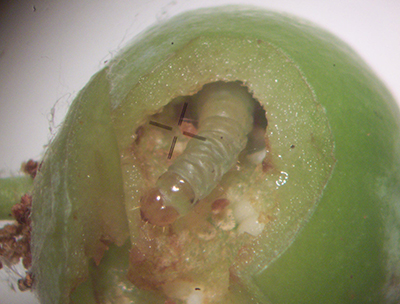West central Michigan small fruit update – June 13, 2017
Strawberries are in harvest with the first and the second harvest having good fruit quality but prevailing hot and dry weather conditions are cutting short the harvest season.

Weather conditions in central Michigan remain hot and dry with daily temperatures climbing to the mid-90s. In addition, windy conditions occurring over the past seven days increased the plant’s demand for supplemental irrigation to compensate for the lack of rain. We are already more than 15 days with no rain and this streak of drought is causing considerable losses of fruit in strawberries and blueberries.
As of June 13, current weather conditions are characterized by daily minimum temperatures averaging 57 degrees Fahrenheit and the daily maximum temperatures averaging 84 F. For the past seven days, no significant rain has occurred in the area. So, precipitation accumulation up until now remains between 13 and 15 inches of rain, depending on the locality.
At this time, the strawberry harvest continues with good harvesting days favored by the dry weather conditions prevalent in the region. The first harvest has been of very good fruit quality, but the second harvest is having issues related to fruit size due to weather conditions during the bloom period, and subsequent lack of rain. To compensate for the lack of rain, growers are irrigating to maintain a healthy crop.
One of the consequences of the current weather conditions is the migration of plant bugs to commercial fruit crops. So, strawberry and raspberry growers may see an increase in the presence of tarnish plant bug and stink bugs in their fields. Therefore, it is important to be alert and scout the fields on a regular basis to take action in case those insect pests become a substantial economic threat. For tarnish plant bug and stink bugs, you may use Danitol and Brigade. Please check the Michigan State University Extension bulletin E0-154 “2017 Michigan Fruit Management Guide” for more insecticide products and recommendations.
Blueberries, on the other hand, continue developing with most varieties in the green fruit stage. Irrigated fields are keeping up with dry weather conditions but non irrigated fields will see an increase in the “June drop” of non-pollinated and partially pollinated fruits. If rain does not occur soon, this phenomenon will be more pronounced in varieties like Jersey and Elliott.
Also, if you do not have irrigation and you need to use soil applied fertilizers, avoid to applying it under the current dry weather conditions. Wait until you have some rain to allow the fertilizer to get incorporated into the soil. Otherwise, the fertilizer will increase the water deficit in your field because the fertilizer competes with plants for the available water in the soil.
Regarding insect pests in blueberries, the cherry fruit worm and cranberry fruit worm are flying in the area. The emergence of the cherry fruit worm adult overwintering generation is almost over. But the cranberry fruit worm still is being caught in substantial numbers in Allegan and Van Buren Counties. The cranberry fruit worm adult emergence reached its peak last week and we expect a large oviposition during this week. So, please check your cranberry fruit worm traps and scout your fields for signs of ovipositions or symptoms of fruit damage.

Cranberry Fruit worm, end of June-early July in Fennville, Michigan.
It is important to remember the symptoms to identify fruitworm damage. Single berry damage is characteristic of cherry fruit worm. Multiple berry damage is characteristic of cranberry fruit worm. Thus, adjust your spray program for fruit worm control accordingly.
Broad spectrum insecticide like Assail, Asana LX, Lannate or Imidan are very effective against fruitworms at this time. Also, they are effective against secondary pests like blueberry aphids responsible for the transmission of the shoe string virus, and the stem blueberry gall wasp that at this time may be present in the field. For more recommended products please see the MSU Extension Bulletin E0-154.



 Print
Print Email
Email

